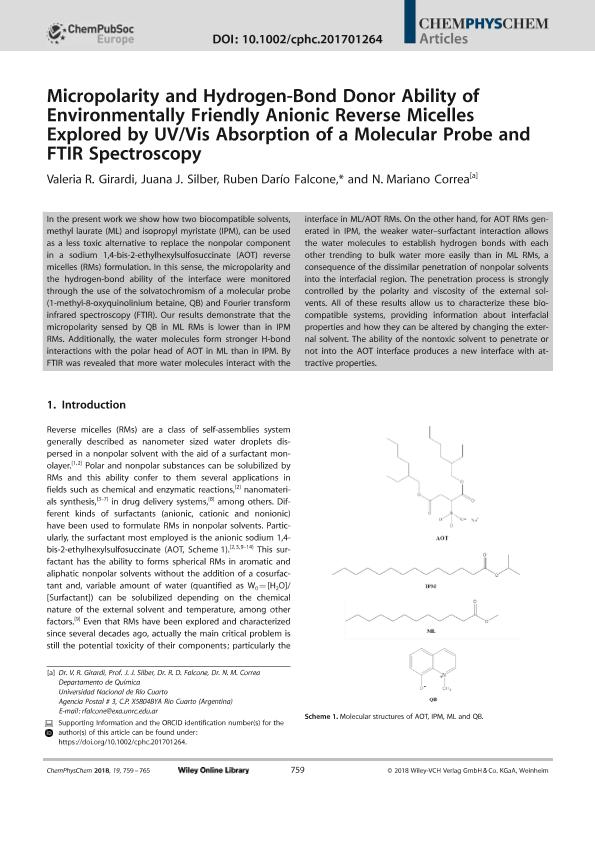Mostrar el registro sencillo del ítem
dc.contributor.author
Girardi, Valeria Romina

dc.contributor.author
Silber, Juana J.
dc.contributor.author
Falcone, Ruben Dario

dc.contributor.author
Correa, Nestor Mariano

dc.date.available
2021-06-07T03:41:54Z
dc.date.issued
2018-03-19
dc.identifier.citation
Girardi, Valeria Romina; Silber, Juana J.; Falcone, Ruben Dario; Correa, Nestor Mariano; Micropolarity and Hydrogen-Bond Donor Ability of Environmentally Friendly Anionic Reverse Micelles Explored by UV/Vis Absorption of a Molecular Probe and FTIR Spectroscopy; Wiley VCH Verlag; Chemphyschem; 19; 6; 19-3-2018; 759-765
dc.identifier.issn
1439-4235
dc.identifier.uri
http://hdl.handle.net/11336/133287
dc.description.abstract
In the present work we show how two biocompatible solvents, methyl laurate (ML) and isopropyl myristate (IPM), can be used as a less toxic alternative to replace the nonpolar component in a sodium 1,4-bis-2-ethylhexylsulfosuccinate (AOT) reverse micelles (RMs) formulation. In this sense, the micropolarity and the hydrogen-bond ability of the interface were monitored through the use of the solvatochromism of a molecular probe (1-methyl-8-oxyquinolinium betaine, QB) and Fourier transform infrared spectroscopy (FTIR). Our results demonstrate that the micropolarity sensed by QB in ML RMs is lower than in IPM RMs. Additionally, the water molecules form stronger H-bond interactions with the polar head of AOT in ML than in IPM. By FTIR was revealed that more water molecules interact with the interface in ML/AOT RMs. On the other hand, for AOT RMs generated in IPM, the weaker water–surfactant interaction allows the water molecules to establish hydrogen bonds with each other trending to bulk water more easily than in ML RMs, a consequence of the dissimilar penetration of nonpolar solvents into the interfacial region. The penetration process is strongly controlled by the polarity and viscosity of the external solvents. All of these results allow us to characterize these biocompatible systems, providing information about interfacial properties and how they can be altered by changing the external solvent. The ability of the nontoxic solvent to penetrate or not into the AOT interface produces a new interface with attractive properties.
dc.format
application/pdf
dc.language.iso
eng
dc.publisher
Wiley VCH Verlag

dc.rights
info:eu-repo/semantics/openAccess
dc.rights.uri
https://creativecommons.org/licenses/by-nc-sa/2.5/ar/
dc.subject
INFRARED SPECTROSCOPY
dc.subject
REVERSE MICELLES
dc.subject
SOLVENT EFFECTS
dc.subject
SURFACTANTS
dc.subject
WATER–SURFACTANT INTERACTIONS
dc.subject.classification
Físico-Química, Ciencia de los Polímeros, Electroquímica

dc.subject.classification
Ciencias Químicas

dc.subject.classification
CIENCIAS NATURALES Y EXACTAS

dc.title
Micropolarity and Hydrogen-Bond Donor Ability of Environmentally Friendly Anionic Reverse Micelles Explored by UV/Vis Absorption of a Molecular Probe and FTIR Spectroscopy
dc.type
info:eu-repo/semantics/article
dc.type
info:ar-repo/semantics/artículo
dc.type
info:eu-repo/semantics/publishedVersion
dc.date.updated
2021-06-02T12:14:20Z
dc.journal.volume
19
dc.journal.number
6
dc.journal.pagination
759-765
dc.journal.pais
Alemania

dc.journal.ciudad
Weinheim
dc.description.fil
Fil: Girardi, Valeria Romina. Universidad Nacional de Rio Cuarto. Facultad de Ciencias Exactas Fisicoquimicas y Naturales. Departamento de Quimica. Area Fisicoquimica Organica; Argentina. Consejo Nacional de Investigaciones Científicas y Técnicas. Centro Científico Tecnológico Conicet - Córdoba; Argentina
dc.description.fil
Fil: Silber, Juana J.. Universidad Nacional de Rio Cuarto. Facultad de Ciencias Exactas Fisicoquimicas y Naturales. Departamento de Quimica. Area Fisicoquimica Organica; Argentina
dc.description.fil
Fil: Falcone, Ruben Dario. Universidad Nacional de Rio Cuarto. Facultad de Ciencias Exactas Fisicoquimicas y Naturales. Departamento de Quimica. Area Fisicoquimica Organica; Argentina. Consejo Nacional de Investigaciones Científicas y Técnicas. Centro Científico Tecnológico Conicet - Córdoba; Argentina
dc.description.fil
Fil: Correa, Nestor Mariano. Universidad Nacional de Rio Cuarto. Facultad de Ciencias Exactas Fisicoquimicas y Naturales. Departamento de Quimica. Area Fisicoquimica Organica; Argentina. Consejo Nacional de Investigaciones Científicas y Técnicas. Centro Científico Tecnológico Conicet - Córdoba; Argentina
dc.journal.title
Chemphyschem

dc.relation.alternativeid
info:eu-repo/semantics/altIdentifier/url/https://chemistry-europe.onlinelibrary.wiley.com/doi/full/10.1002/cphc.201701264
dc.relation.alternativeid
info:eu-repo/semantics/altIdentifier/doi/https://doi.org/10.1002/cphc.201701264
Archivos asociados
